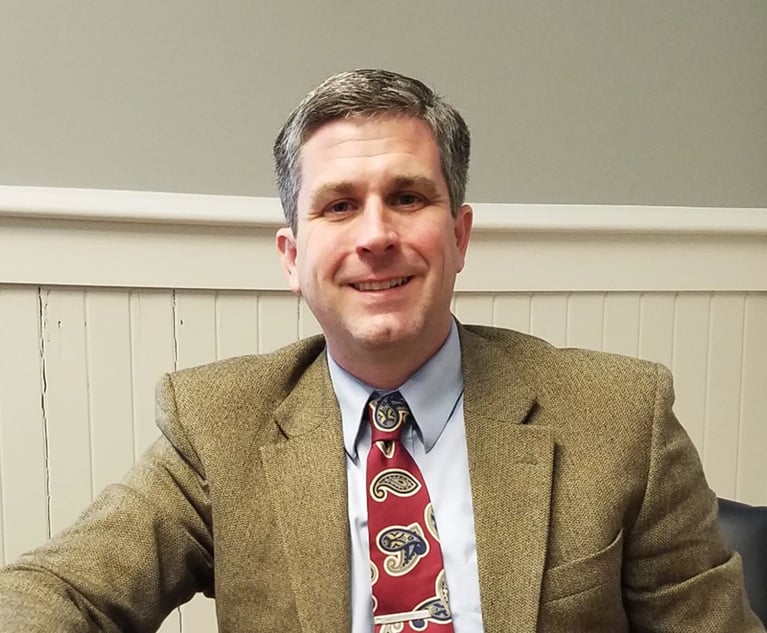Revived $35M Verdict Rolls Back to Trial for Six Flags' Tab
The Court of Appeals, noting that the Supreme Court of Georgia affirmed its holding that the evidence was sufficient to support the jury's verdict as to liability in Joshua Martin's premises-liability action, sent the case back to Cobb County to reconsider how much the amusement park should pay.
October 13, 2017 at 08:25 PM
4 minute read

The $35 million verdict the Georgia Supreme Court reinstated in June made another step Thursday on its path back to the trial court for reconsideration of how much of that money Six Flags Over Georgia should pay.
“The Supreme Court of Georgia affirmed in part and reversed in part our previous decision in Six Flags Over Georgia II, L.P. v. Martin, 335 Ga. App. 350,” Georgia Court of Appeals Chief Judge Stephen Dillard wrote in a unanimous whole court opinion released Thursday. “Specifically, the Supreme Court of Georgia affirmed our holding that the evidence was sufficient to support the jury's verdict as to liability in Joshua Martin's premises-liability action against Six Flags Over Georgia II, L.P. (albeit for different reasons), but reversed our decision to the extent that we held that, due to an apportionment error, the case must be retried in its entirety.”
Dillard went on to note that the high court instead “concluded that, upon remand to the trial court, the apportionment error, which is detailed in our original opinion, requires a retrial only as to apportionment, and thus, the Supreme Court remanded the case to this Court with direction that we remand the case to the trial court for further proceedings. … Accordingly, we adopt the judgment of the Supreme Court of Georgia as our own, vacate the jury's verdict with respect to apportionment of damages only, and remand the case for further proceedings consistent with the opinion of our Supreme Court.”
In a trial before Cobb County Superior Court Judge Kathryn Tanksley, the jury placed 92 percent of the blame on Six Flags and 2 percent on each of four attackers. Six Flags argued successfully on appeal that more attackers should be added—giving the theme park a shot at reducing its judgment lower than the original $32 million tab.
Joshua Martin was 19 and celebrating a friend's college acceptance in 2007 when he was attacked by a mob that included Six Flags employees while waiting for a bus to take him home. Theme park lawyers failed in their assertion that Six Flags was not liable because Martin had left the gates.
In writing the high court's opinion, Justice Britt Grant used the term “brutal” to describe the attack that left Martin paralyzed and brain damaged.
“Regarding the contours of premises liability, we agree that the jury was authorized to find Six Flags liable for the breach of its duty to exercise ordinary care in keeping its premises safe for invitees, although for a different reason than that articulated by the Court of Appeals,” Grant wrote. “Because the attack that caused Martin's injuries began while both he and his assailants were on Six Flags property, Six Flags' liability is not extinguished simply because Martin stepped outside the property's boundaries while attempting to distance himself from his attackers.”
Lawyers for both sides took some comfort in the Supreme Court's decision.
Six Flags appellate counsel Laurie Webb Daniel of Holland & Knight noted that the Grant opinion “ruled that Six Flags' portion of the damages award is an open question that must be resolved by a jury.”
Martin's appellate lawyer, Michael Terry of Bondurant Mixson & Elmore, praised the high court's decision after its release in June.
“It is clear that Justice Grant and the entire Supreme Court focused on both the details of this case and the bigger picture of the development of the law,” Terry said. “This opinion brings much needed clarity to the scope of a new trial for apportionment errors. This has been a long road for Joshua, and we are happy that he will be able to obtain the care and support he needs.”
The Court of Appeals case is Six Flags v. Martin, Nos. A15A0828 and A15A0829.
This content has been archived. It is available through our partners, LexisNexis® and Bloomberg Law.
To view this content, please continue to their sites.
Not a Lexis Subscriber?
Subscribe Now
Not a Bloomberg Law Subscriber?
Subscribe Now
NOT FOR REPRINT
© 2025 ALM Global, LLC, All Rights Reserved. Request academic re-use from www.copyright.com. All other uses, submit a request to [email protected]. For more information visit Asset & Logo Licensing.
You Might Like
View All
On The Move: Squire Patton Boggs, Akerman Among Four Firms Adding Atlanta Partners
7 minute read

Justice 'Weaponization Working Group' Will Examine Officials Who Investigated Trump, US AG Bondi Says

Trending Stories
- 1States Accuse Trump of Thwarting Court's Funding Restoration Order
- 2Microsoft Becomes Latest Tech Company to Face Claims of Stealing Marketing Commissions From Influencers
- 3Coral Gables Attorney Busted for Stalking Lawyer
- 4Trump's DOJ Delays Releasing Jan. 6 FBI Agents List Under Consent Order
- 5Securities Report Says That 2024 Settlements Passed a Total of $5.2B
Who Got The Work
J. Brugh Lower of Gibbons has entered an appearance for industrial equipment supplier Devco Corporation in a pending trademark infringement lawsuit. The suit, accusing the defendant of selling knock-off Graco products, was filed Dec. 18 in New Jersey District Court by Rivkin Radler on behalf of Graco Inc. and Graco Minnesota. The case, assigned to U.S. District Judge Zahid N. Quraishi, is 3:24-cv-11294, Graco Inc. et al v. Devco Corporation.
Who Got The Work
Rebecca Maller-Stein and Kent A. Yalowitz of Arnold & Porter Kaye Scholer have entered their appearances for Hanaco Venture Capital and its executives, Lior Prosor and David Frankel, in a pending securities lawsuit. The action, filed on Dec. 24 in New York Southern District Court by Zell, Aron & Co. on behalf of Goldeneye Advisors, accuses the defendants of negligently and fraudulently managing the plaintiff's $1 million investment. The case, assigned to U.S. District Judge Vernon S. Broderick, is 1:24-cv-09918, Goldeneye Advisors, LLC v. Hanaco Venture Capital, Ltd. et al.
Who Got The Work
Attorneys from A&O Shearman has stepped in as defense counsel for Toronto-Dominion Bank and other defendants in a pending securities class action. The suit, filed Dec. 11 in New York Southern District Court by Bleichmar Fonti & Auld, accuses the defendants of concealing the bank's 'pervasive' deficiencies in regards to its compliance with the Bank Secrecy Act and the quality of its anti-money laundering controls. The case, assigned to U.S. District Judge Arun Subramanian, is 1:24-cv-09445, Gonzalez v. The Toronto-Dominion Bank et al.
Who Got The Work
Crown Castle International, a Pennsylvania company providing shared communications infrastructure, has turned to Luke D. Wolf of Gordon Rees Scully Mansukhani to fend off a pending breach-of-contract lawsuit. The court action, filed Nov. 25 in Michigan Eastern District Court by Hooper Hathaway PC on behalf of The Town Residences LLC, accuses Crown Castle of failing to transfer approximately $30,000 in utility payments from T-Mobile in breach of a roof-top lease and assignment agreement. The case, assigned to U.S. District Judge Susan K. Declercq, is 2:24-cv-13131, The Town Residences LLC v. T-Mobile US, Inc. et al.
Who Got The Work
Wilfred P. Coronato and Daniel M. Schwartz of McCarter & English have stepped in as defense counsel to Electrolux Home Products Inc. in a pending product liability lawsuit. The court action, filed Nov. 26 in New York Eastern District Court by Poulos Lopiccolo PC and Nagel Rice LLP on behalf of David Stern, alleges that the defendant's refrigerators’ drawers and shelving repeatedly break and fall apart within months after purchase. The case, assigned to U.S. District Judge Joan M. Azrack, is 2:24-cv-08204, Stern v. Electrolux Home Products, Inc.
Featured Firms
Law Offices of Gary Martin Hays & Associates, P.C.
(470) 294-1674
Law Offices of Mark E. Salomone
(857) 444-6468
Smith & Hassler
(713) 739-1250






